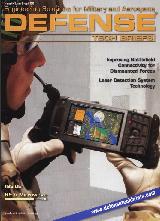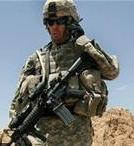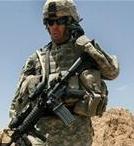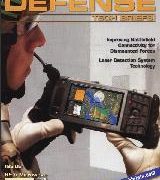 AMREL’s handheld DB6 is on the cover of this month’s Defense Tech Briefs. April’s issue’s featured article is “Improving Battlefield Connectivity for Dismounted Forces,” so it’s only natural that they would spotlight the smallest, rugged, handheld in the world that can run a full Windows OS. Click here to read about the search for the ideal front-line computing platform.
AMREL’s handheld DB6 is on the cover of this month’s Defense Tech Briefs. April’s issue’s featured article is “Improving Battlefield Connectivity for Dismounted Forces,” so it’s only natural that they would spotlight the smallest, rugged, handheld in the world that can run a full Windows OS. Click here to read about the search for the ideal front-line computing platform.
Posts
 The Army has just finished its second Network Integration Evaluation (NIE). This large exercise appears to have accomplished its primary goals of accelerating the notoriously slow acquisition process, field-testing entire networks, and gathering valuable end-user feedback. Sometime massive bureaucratic efforts do work.
The Army has just finished its second Network Integration Evaluation (NIE). This large exercise appears to have accomplished its primary goals of accelerating the notoriously slow acquisition process, field-testing entire networks, and gathering valuable end-user feedback. Sometime massive bureaucratic efforts do work.
Although complete tactical communication systems were tested, the smartphones were the center of attention. Some results are already filtering out. Read more
 The Department of Defense is determined to field mobile devices that connect soldiers to networks for the rapid transmission of data. A number of forces have inspired this initiative:
The Department of Defense is determined to field mobile devices that connect soldiers to networks for the rapid transmission of data. A number of forces have inspired this initiative:
- Younger soldiers, by their own volition, are using their own smartphones and tablets whenever possible.
- The doctrine of network-centric warfare has upended the traditional paradigm of sending ISR to the rear echelons and is instead emphasizing delivering real-time info to the front lines.
- Enemy forces have successfully used cell phones to relay information in their own networks. Read more
Watch Ted Ventresca of www.fedmil.com interview Ron McMahan, VP Engineering Solutions at AMREL, about the ROCKY DB6, the world’s smallest rugged handheld that runs Windows 7/Linux.
 See AMREL’s new interoperable Payload Controller Paylaod Controller, handheld OCU, as well as the the Rocky DB6, the world’s smallest rugged computer with full Windows 7/Linux. Stop by AMREL’s booth #3030, and get a good look at our line of fully rugged computers as wll as our suite of interoperable solutions.
See AMREL’s new interoperable Payload Controller Paylaod Controller, handheld OCU, as well as the the Rocky DB6, the world’s smallest rugged computer with full Windows 7/Linux. Stop by AMREL’s booth #3030, and get a good look at our line of fully rugged computers as wll as our suite of interoperable solutions.
 AMREL releases the first Payload Controller that uses swappable, field-expedient Radio Control Modules (RCMs). Radio components are integrated into the RCM, which fit into AMREL’s revolutionary swappable device bays. RCMs can be easily switched in and out by ordinary personnel, enabling it to easily change applications.
AMREL releases the first Payload Controller that uses swappable, field-expedient Radio Control Modules (RCMs). Radio components are integrated into the RCM, which fit into AMREL’s revolutionary swappable device bays. RCMs can be easily switched in and out by ordinary personnel, enabling it to easily change applications.
Developed under AMREL’s Flexpedient® Technology, RCMs were first used in AMREL OCU solutions. RCMs enabled AMREL to be the first company to produce an OCU solution that could control heterogeneous unmanned systems – even when they have diverse operating systems and different origins of manufacture. Read more
See the Rocky DB6, the world’s smallest rugged computer with full Windows 7/Linux, at FOSE 2011. This powerful little handheld weighs only 1.5 pounds, but supports the same programs as a laptop at a fraction of the energy. Come by AMREL’s booth 115 and ask about our FREE life-size die cuts!
See for yourself just how compact the ROCKY DB6 handheld is . Put it in a cargo pocket or hold it in your hand, the ROCKY DB6 handheld is the smallest rugged computer with full Windows/Linux in the world. To get a FREE life size cut-out, just click here.
. Put it in a cargo pocket or hold it in your hand, the ROCKY DB6 handheld is the smallest rugged computer with full Windows/Linux in the world. To get a FREE life size cut-out, just click here.
Those who work in an engineering/hi-tech culture know the  importance of “specs.” Go to any biometric solution provider’ workplace, and you will see highly trained professionals closely examining the latest RFP, eagerly analyzing the specifications, as well as the Scope of Work.
importance of “specs.” Go to any biometric solution provider’ workplace, and you will see highly trained professionals closely examining the latest RFP, eagerly analyzing the specifications, as well as the Scope of Work.
Focusing on specifications alone can lead to not only tunnel vision, but also to a kind of passivity. We shouldn’t sit around waiting for the RFP to tell us what to do. We should go out into the field at every opportunity and seek input from end-users. That’s why AMREL is a fixture at events such as the Tactical Network Topology (TNT) and Biometrics Field Experiments (BFEX). Read more
National Defense Industrial Association has a highly informative article, Army, Marines Face Uphill Battle To Lighten Troops’ Battery Load, about batteries and the heavy load they impose on soldiers. Of the 130 pounds of gear a modern soldier lugs around, 35 may be due to batteries. This excessive weight limits his maneuverability and may even cause injuries.
In addition, batteries are expensive (“An infantry battalion on a one-year deployment typically burns through $150,000 worth of batteries”). The frequent need to replace them, as well as their complete lack of standardization, presents a logistical nightmare. Read more
American Reliance, Inc.
789 N Fair Oaks Ave,
Pasadena, CA 91103
Office Hours
Monday-Friday:
8:00 am – 5:00 pm PST
Saturday: Closed
Sunday: Closed
Main: +1 (626) 482-1862
Fax: +1 (626) 226-5716
Email: AskUs@amrel.com
Blog Posts
Mobile Biometric Solutions
Mobile Biometric Smartphones & Tablets
BioFlex S® Commercial Smartphones
BioSense AT80B | 8″ Android Biometric Tablet
BioSense PA5 | 10.1″ (Gen 2) Android Biometric Tablet
BioSense PA5 | 10.1″ Android Biometric Tablet
BIOPTIX PM3B | 7″ Windows Biometric Tablet
BIOPTIX PM5B | 10.1″ Windows Biometric Atom Tablet






